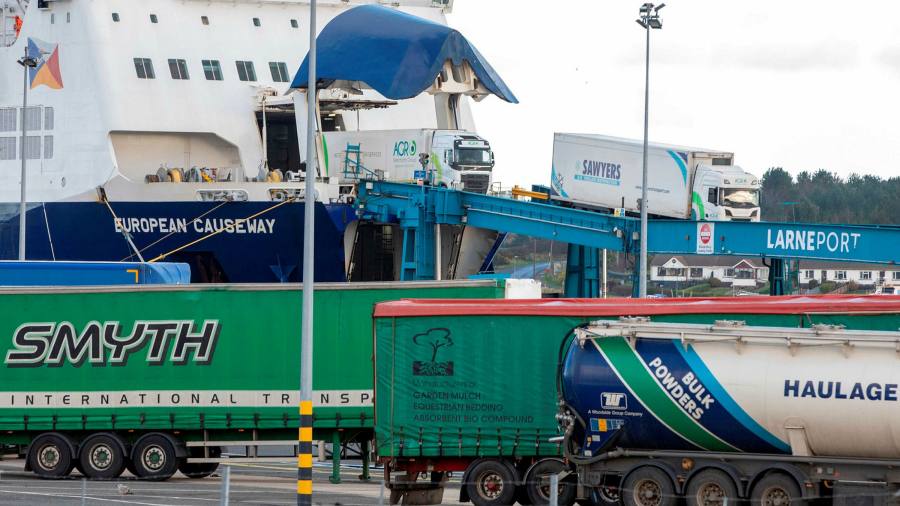[ad_1]
The writer is an adviser at consultancy Global Counsel and was special adviser on Europe to Theresa May
The implementation of the Northern Ireland protocol is a mess that is snarling up the new relationship between the UK and the EU. This was predictable: both the British government and the EU should have known that its terms were unlikely to work for Northern Ireland. Both sides now need to come together to find a solution.
The protocol governs trade relations between Northern Ireland and its neighbours. Trade borders mark the divide between customs territories and markets, and Brexit means the UK is no longer part of the EU’s single market and customs union. So there must be a system for goods to be checked and controlled as they move between the UK and the EU. But how can that be squared with Northern Ireland’s mix of British and Irish identities?
The protocol’s answer is to split Northern Ireland off from the UK market in goods and impose a border in the Irish Sea. But for people in Northern Ireland, who are no longer able order some goods online from Britain, it can feel like a border within the home.
Borders, whether with the Republic of Ireland or with Britain, do not work for Northern Ireland. They separate either the nationalist or the unionist community from their perceived larger whole. A border for one but not the other is seen as breaking a core principle of the Belfast/Good Friday Agreement, which ended the conflict in Northern Ireland, of a “parity of esteem†between the communities. So for Northern Ireland a trade barrier is not about the regulation of goods but a question of identity. The unionist community feels deeply slighted on both counts. And their consent has been neither sought nor given.
It should also be no surprise that any government will, at best, dislike a trade barrier within its own country. And this British government has a guilty conscience because it agreed to one out of expediency. It held an election and got the kind of Brexit it wanted when, politically, it needed it.
This protocol will continue to generate ill will and instability in the UK-EU relationship and in Northern Irish politics. But the border between the two must be managed somehow. The UK and the EU will be separate markets for the foreseeable future. The question is whether the protocol can be made tolerable enough for Northern Ireland’s communities to live with. If it can, two things need to happen.
First, British ministers must realise that they will achieve nothing without restoring trust and goodwill. Breaches of international law and commitments recently undertaken corrode both. Disrespect to the EU does not persuade them. The refusal to acknowledge the reality of commitments it made — for instance, that the protocol means a trade border — also hinders an honest discussion. The moral high ground matters, not least in Washington. This is all the more regrettable given the substantial strength of the British government’s case that the protocol will not work on the ground unless it is implemented flexibly.
Second, the EU and national capitals must understand that the Northern Ireland protocol is not a technical trade issue. The UK is not seeking better market access through the back door, but to make a peace process work. The EU and its member states are now, whether they realise it or not, part owners of that peace process. That means not seeing every British proposal through the prism of leverage but rather whether it makes the protocol acceptable to the people of Northern Ireland, while protecting the Republic of Ireland’s place in the EU’s single market. It also means understanding the political sensitivities of that process. Assertions that the bloc stands with Dublin may be meant as a demonstration of solidarity with a fellow EU member state, but are perceived by unionists as a sign that Brussels stands against them.
There are some reasons to be optimistic. Northern Ireland aside, the EU-UK agreement is bedding in. There are problems: the diplomatic recognition of the EU representative to the UK, the EU’s mercantilist approach to financial services, and the British government’s failure to be candid about the consequences of the agreement it negotiated. But these are relative irritations and are not fundamental.
However, the situation in Northern Ireland could seriously deteriorate. Power-sharing is fragile. Lockdowns may have muted public reaction to the protocol’s consequences for everyday life. But destabilisation in Northern Ireland could have knock-on effects for the whole UK-EU relationship.
Northern Ireland needs a political solution and the time to find one is not infinite. The point of the protocol is to protect the achievements of the peace process. This requires the UK and the EU to take a tailored, light-touch approach to the trade border.
[ad_2]
Source link





